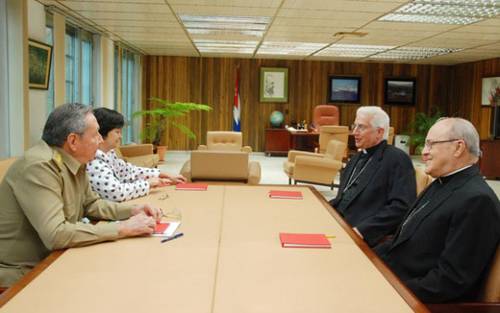
Sábado 22 de mayo de 2010, p. 21
La Habana,
21 de mayo. Guillermo Fariñas, en huelga de hambre y sed
hace casi tres meses, en demanda de la liberación de los
opositores presos más enfermos, dijo hoy que aceptaría una
propuesta decorosa
de la Iglesia católica para suspender
su protesta, tras la apertura del diálogo entre el clero y el
presidente Raúl Castro.
Si la propuesta es decorosa, la
aceptaremos
, dijo el activista a La Jornada por vía
telefónica. Si no la consideramos así, no la aceptaremos y
seguiremos
.
El cardenal Jaime Ortega informó el pasado jueves que dos emisarios católicos han hablado con Fariñas, no para pedirle que cese la protesta, sino para transmitirle el mensaje de que confíe en que la gestión eclesiástica ante el gobierno cubano puede facilitar la liberación de presos.
Fariñas dijo que los sacerdotes le habían
anticipado que se produciría un contacto al más alto nivel
,
tras lo cual le trasladarían una propuesta concreta
. La
huelga de hambre y la liberación de opositores presos fue parte
de la conversación que sostuvo Castro el miércoles con Ortega y
el arzobispo Dionisio García.
Durante su internamiento ha tenido tres crisis provocadas por un estafilococo dorado, que se le ha tratado con antibióticos, explicó su madre, Alicia Hernández.
Esta semana se le detectó una cistitis, lo que obligó a practicarle un urocultivo y a retirarle el catéter por el cual recibe alimentación artificial, que sólo se reanudará cuando se precise el diagnóstico, dijo Hernández, quien es enfermera jubilada. Mientras, el paciente tiene hidratación por una vena periférica.
Este mes Fariñas también empezó a recibir
un medicamento especial para la protección de las vías
digestivas. Su estado es muy depauperado
, pero está
consciente, orientado y estable, dentro de su gravedad, informó
su madre.
Ortega dijo que no hay compromiso ni plazo
concreto con el gobierno, pero que la cuestión de los presos se
trata seriamente
.